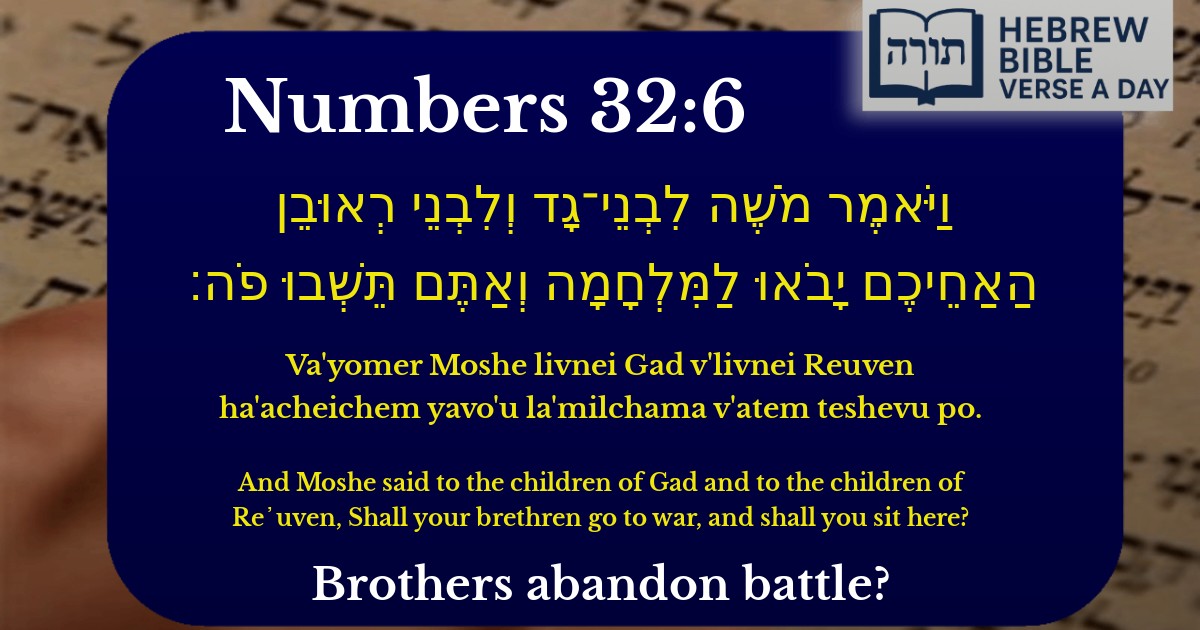Join Our Newsletter To Be Informed When New Videos Are Posted
Join the thousands of fellow Studends who rely on our videos to learn how to read the bible in Hebrew for free!
Hebrew Text
וַיֹּאמֶר מֹשֶׁה לִבְנֵי־גָד וְלִבְנֵי רְאוּבֵן הַאַחֵיכֶם יָבֹאוּ לַמִּלְחָמָה וְאַתֶּם תֵּשְׁבוּ פֹה׃
English Translation
And Moshe said to the children of Gad and to the children of Re᾽uven, Shall your brethren go to war, and shall you sit here?
Transliteration
Va'yomer Moshe livnei Gad v'livnei Reuven ha'acheichem yavo'u la'milchama v'atem teshevu po.
Hebrew Leining Text
וַיֹּ֣אמֶר מֹשֶׁ֔ה לִבְנֵי־גָ֖ד וְלִבְנֵ֣י רְאוּבֵ֑ן הַאַֽחֵיכֶ֗ם יָבֹ֙אוּ֙ לַמִּלְחָמָ֔ה וְאַתֶּ֖ם תֵּ֥שְׁבוּ פֹֽה׃
וַיֹּ֣אמֶר מֹשֶׁ֔ה לִבְנֵי־גָ֖ד וְלִבְנֵ֣י רְאוּבֵ֑ן הַאַֽחֵיכֶ֗ם יָבֹ֙אוּ֙ לַמִּלְחָמָ֔ה וְאַתֶּ֖ם תֵּ֥שְׁבוּ פֹֽה׃
🎵 Listen to leining
Parasha Commentary
📚 Talmud Citations
This verse is quoted in the Talmud.
📖 Bava Batra 121b
The verse is referenced in a discussion about the division of the Land of Israel among the tribes, particularly concerning the tribes of Gad and Reuben who requested land on the east side of the Jordan.


Context of the Verse
The verse (Bamidbar 32:6) records Moshe's rebuke to the tribes of Reuven and Gad after they requested to settle on the eastern side of the Jordan River, outside the borders of Eretz Yisrael. Moshe challenges them, questioning whether they would allow their brethren to fight alone while they remained behind.
Rashi's Explanation
Rashi (Bamidbar 32:6) explains that Moshe suspected the tribes of Reuven and Gad of lacking faith in Hashem's promise to help Bnei Yisrael conquer the land. He compares their reluctance to join the battle to the sin of the meraglim (spies), who discouraged the nation from entering Eretz Yisrael. Rashi emphasizes that Moshe's words were a sharp rebuke, warning them against repeating the mistakes of the previous generation.
Rambam's Perspective
Rambam (Hilchot Melachim 5:1) discusses the communal obligation of all tribes to participate in the conquest of Eretz Yisrael. He derives from this verse that no segment of Klal Yisrael may exempt itself from the collective responsibility of settling the land and defending it. This principle applies not only to the initial conquest but also to future generations in maintaining Jewish sovereignty over the land.
Midrashic Insights
Halachic Implications
The Gemara (Sotah 44a) derives from this verse that all Jews are responsible for one another (kol Yisrael areivim zeh lazeh). Even after the tribes of Reuven and Gad eventually agreed to fight alongside their brethren, the initial hesitation created a lasting lesson about communal responsibility. The Shulchan Aruch (Choshen Mishpat 163:1) applies this principle to financial obligations as well.
Chassidic Interpretation
The Sefat Emet (Parshat Matot) explains that Moshe's concern was not merely about military strategy but about maintaining unity of purpose. True service of Hashem requires all of Klal Yisrael to be united in their mission, and separating oneself from the community's spiritual goals is akin to abandoning them in battle.